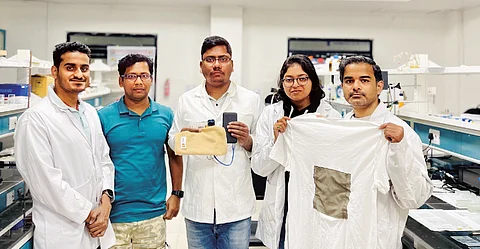
- Home
- Live Blog
- Breaking News
- Top Headlines
- Cities
- NE News
- Sentinel Media
- Sports
- Education
- Jobs

GUWAHATI: Indian Institute of Technology Guwahati researchers have developed a water-repellent, conductive textile that converts electricity and sunlight into heat. Designed to keep wearers warm in cold environments, this innovation addresses the serious health risks posed by prolonged exposure to very low temperatures, including hemoconcentration-based arterial blood clotting, breathing difficulties, and weakened immunity.
Extreme cold temperatures can lead to health problems that can even be fatal. Studies indicate that deaths due to extreme cold outnumber those caused by extreme heat. Traditional solutions that protect oneself from extreme cold, such as heaters or layered clothing, are often bulky or require a constant power source. Conductive textiles offer a lightweight, flexible alternative, but existing versions often have limitations, such as poor durability, high power consumption, and vulnerability to water exposure.
To overcome these challenges, the IIT Guwahati research team developed a novel approach by spraying ultra-thin and clean silver nanowires onto cotton fabric to make it conductive. These nanowires are 100,000 times thinner than a human hair, allowing electricity to flow through the fabric, helping it generate heat while remaining soft and flexible. Due to its exceptional electrical conductivity and the ability to convert both electricity and sunlight into heat, silver nanowires were chosen for this experiment. The low electrical resistance of silver allows the electrothermal conversion at low applied voltage and eliminates the risk of electrocution.
One limitation with silver nanowires is that they can tarnish over time, affecting performance. To address this, researchers applied a water-repellent coating to the silver nanowires that protects against oxidation, water, and stains.
The findings of this research have been published in the journal Nano-Micro-Small in a paper co-authored by Prof. Uttam Manna, Department of Chemistry, IIT Guwahati, along with his research team, stated a press release.
Also read: Guwahati: IIT-G develops nanotechnology for advanced cholesterol and triglyceride detection
Also Watch: